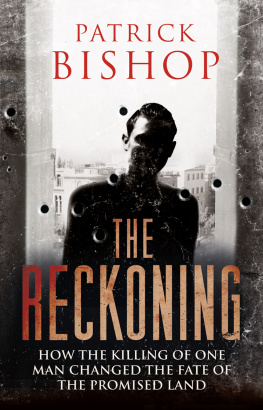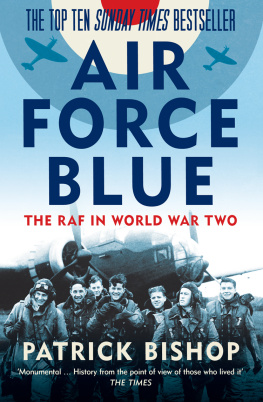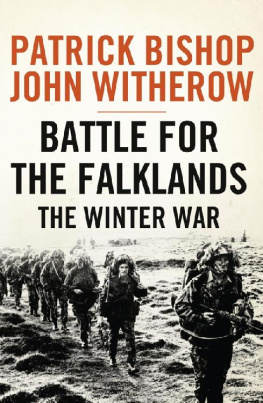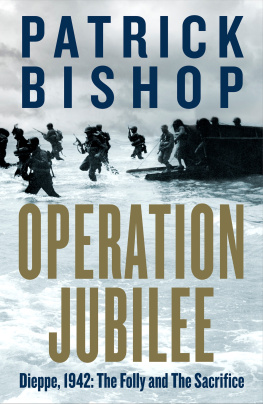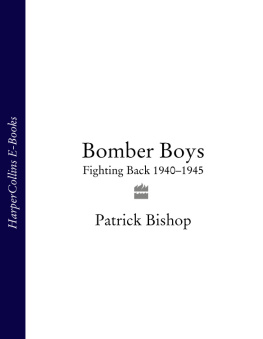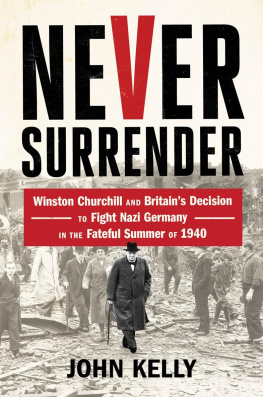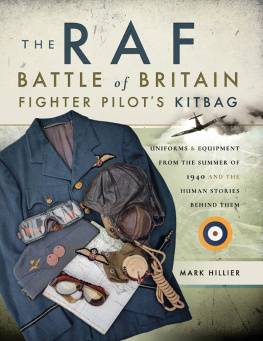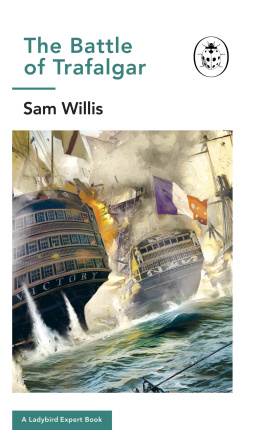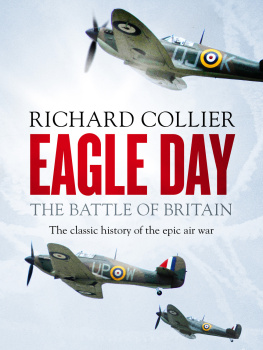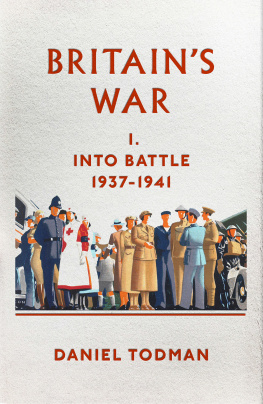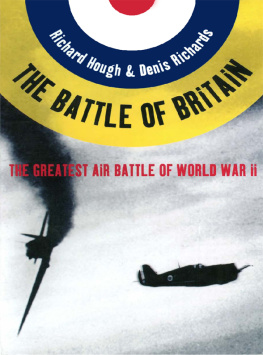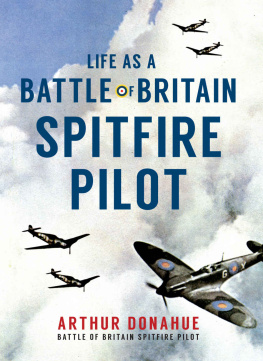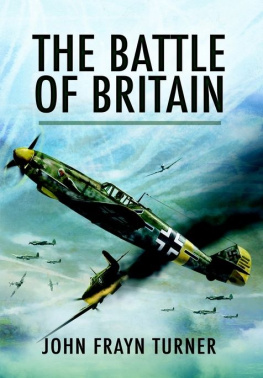Patrick Bishop was a foreign correspondent for over 25 years. He covered the recapture of the Falkland Islands in 1982, accompanying the British Task Force, and went on to report on numerous other wars and conflicts around the world. In the last five years he has emerged as a war historian of the first rank with his top-ten bestsellers Fighter Boys and Bomber Boys, which cast new light on the men who flew in the Battle of Britain and the Strategic Air Campaign against Nazi Germany.
Also by Patrick Bishop
The Provisional IRA (with Eammon Mallie)
The Irish Empire
Fighter Boys
Bomber Boys
3 Para
Ground Truth
A Good War (novel)
BATTLE OF BRITAIN
PATRICK BISHOP


New York London
2009, 2010 by Patrick Bishop
Cover artwork courtesy of Imperial War Museums IWM CH 3056. Photographer: Crouch F W (Mr). For more details see .
All rights reserved. No part of this book may be reproduced in any form or by any electronic or mechanical means, including information storage and retrieval systems, without permission in writing from the publisher, except by reviewers, who may quote brief passages in a review. Scanning, uploading, and electronic distribution of this book or the facilitation of the same without the permission of the publisher is prohibited.
Please purchase only authorized electronic editions, and do not participate in or encourage electronic piracy of copyrighted materials. Your support of the authors rights is appreciated.
Any member of educational institutions wishing to photocopy part or all of the work for classroom use or anthology should send inquiries to Permissions c/o Quercus Publishing Inc., 31 West 57th Street, 6th Floor, New York, NY 10019, or to .
ISBN 978-1-62365-376-7
Distributed in the United States and Canada by Random House Publisher Services
c/o Random House, 1745 Broadway
New York, NY 10019
www.quercus.com
CONTENTS
INTRODUCTION
A LIFE AND DEATH
STRUGGLE
history or myth?
THE BATTLE OF BRITAIN was unique. Nothing like it had happened before. Nothing like it was to happen again. For the first time in history a great military encounter was fought in the air.
Appropriately for the Age of the Common Man it took place, spectacularly, in the full sight of ordinary people, above fields and villages, streets and cities. The visibility of the combat helped to give the battle its pre-eminent place in the British folk memory of the Second World War, becoming a towering legend of skill, determination and sacrifice that seems to become more fascinating with the passing of time.
Since the end of the Second World War, the episode has been under constant reappraisal, however. The processes of historical revisionism have sought to shrink the legend to less epic proportions. But the point of a legend is that it has outgrown mere facts. No amount of academic reappraisal is likely to change the larger, more resonant, sense of the battle as a David-and-Goliath contest, in which virtue triumphed over the forces of evil.
In researching the history of the battle, one is struck by how remarkably sound some of the myths underpinnings actually are. Many of the scenes popularly associated with the event are, indeed, true, and the heroes of the tale closely match their propaganda images. Pilots really were, by and large, young, modest and surprisingly carefree, and would conclude a hard days flying and fighting by climbing into jalopies and heading to the nearest pub.
The country was gripped by the feeling that, to use Churchills phrase, a great climacteric had been reached. However much historians might subsequently have questioned the seriousness of Hitlers invasion plans, a sense of impending onslaught felt frighteningly real to the people of Britain in the middle of 1940. Though later assessments might seek to downgrade the contribution the victory made to Germanys eventual defeat, that was not how it was seen at the time. In a BBC broadcast in September 1942, George Orwell described it as one of the greatest events in history. It is becoming clear, he said, that the Battle of Britain ranks in importance with Trafalgar, Salamis, the defeat of the Spanish Armada and other battles of the past in which the invading forces of a seemingly invincible monarch or dictator have been beaten back and which have formed a turning point in history.
This judgement may have been rather premature; but it has turned out to be essentially true. The Battle of Britain did not make eventual victory certain, but it made it possible. It provided the answers to some crucial questions, and those answers were to shape the future direction of the war.
The first question was a basic one: would Britain fight? It is difficult now to imagine how dark the future seemed from Britains perspective at the end of June 1940. The British Army was licking its wounds, having been beaten back across the Channel from Dunkirk. France had fallen with unimagined suddenness, its army and air force collapsing in a matter of a few weeks from the shock of a collision with an enemy that was bold, skilful and superbly equipped. Britain really did stand alone. It had friends, but no real allies. The United States was supportive, but remained prudent and watchful. It sensibly stood and awaited the evidence of Britains fighting resolve before making any firm commitment.
The decision to stand and fight was by no means as inevitable as it has come to appear. Hitler seems to have genuinely hoped he could avoid a direct assault on Britain, and he believed that ultimately the countrys rulers would see where their interests lay. It was for that reason that plans for invasioncodenamed Seelwe (Sea Lion)were drawn up only tardily. Even as late as 19 July, when the initial skirmishing in what has come to be seen as the battle period proper was well advanced, Hitler issued another appeal to British reason and common sense.
A positive response would not have spared Britain from essential servitude. Hitler had reasonable grounds for thinking, though, that his overture might be favourably received. Churchill had come to power only in May, and his appointment was not regarded with universal approval. To many, such as those for whom the memory of his responsibility regarding the inglorious Dardanelles campaign of the First World War was still fresh, he was a romantic and an adventurer who would make a disastrous war leader. He was flanked by ministers whose instincts were for a negotiated peace.
It was piquant, then, that it was the man most associated with compromise with Nazi Germany, Foreign Secretary Lord Halifax, who was instructed to tell Hitler that his Appeal to Reason had been rejected. The public quickly caught the mood of defiance. The isolation brought about by the French defeat in June even brought a sense of relief. Thank God we are on our own and not saddled with a craven ally was the reaction of Peter Brothers, a No. 32 Squadron pilot at Biggin Hill, when he heard the news. It was a feeling shared by his monarch, George VI. But it was not until the Luftwaffe had been swept from Britains daytime skies that Churchills approach won general approval.
The second question was: having chosen to fight, could the British actually win? Did they have enough men and aircraft to do so? If they did, were they of the right sort? What about the assertion, made repeatedly in the interwar years by those who ought to know, that the bomber would always get through?
Next page

